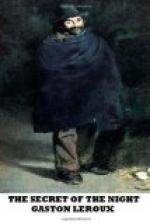“He believes me! He believes me! And you would have believed me also if you had been my real mother.”
Her head fell back and she dropped unconscious to the floor. Feodor fell to his knees, tending her, deploring her, motioning the others out of the room.
“Go away! All of you, go! All! You, too, Matrena Petrovna. Go away!”
They disappeared, terrified by his savage gesture.
In the little datcha across the river at Krestowsky there was a body. Secret Service agents guarded it while they waited for their chief. Michael Nikolaievitch had come there to die, and the police had reached him just at his last breath. They were behind him as, with the death-rattle in his throat, he pulled himself into his chamber and fell in a heap. Katharina the Bohemian was there. She bent her quick-witted, puzzled head over his death agony. The police swarmed everywhere, ransacking, forcing locks, pulling drawers from the bureau and tables, emptying the cupboards. Their search took in everything, even to ripping the mattresses, and not respecting the rooms of Boris Mourazoff, who was away this night. They searched thoroughly, but they found absolutely nothing they were looking for in Michael’s rooms. But they accumulated a multitude of publications that belonged to Boris: Western books, essays on political economy, a history of the French Revolution, and verses that a man ought to hang for. They put them all under seal. During the search Michael died in Katharina’s arms. She had held him close, after opening his clothes over the chest, doubtless to make his last breaths easier. The unfortunate officer had received a bullet at the back of the head just after he had plunged into the Neva from the rear of the Trebassof datcha and started to swim across. It was a miracle that he had managed to keep going. Doubtless he hoped to die in peace if only he could reach his own house. He apparently had believed he could manage that once he had broken through his human bloodhounds. He did not know he was recognized and his place of retreat therefore known.
Now the police had gone from cellar to garret. Koupriane came from the Trebassof villa and joined them, Rouletabille followed him. The reporter could not stand the sight of that body, that still had a lingering warmth, of the great open eyes that seemed to stare at him, reproaching him for this violent death. He turned away in distaste, and perhaps a little in fright. Koupriane caught the movement.
“Regrets?” he queried.
“Yes,” said Rouletabille. “A death always must be regretted. None the less, he was a criminal. But I’m sincerely sorry he died before he had been driven to confess, even though we are sure of it.”
“Being in the pay of the Nihilists, you mean? That is still your opinion?” asked Koupriane.
“Yes.”
“You know that nothing has been found here in his rooms. The only compromising papers that have been found belong to Boris Mourazoff.”




